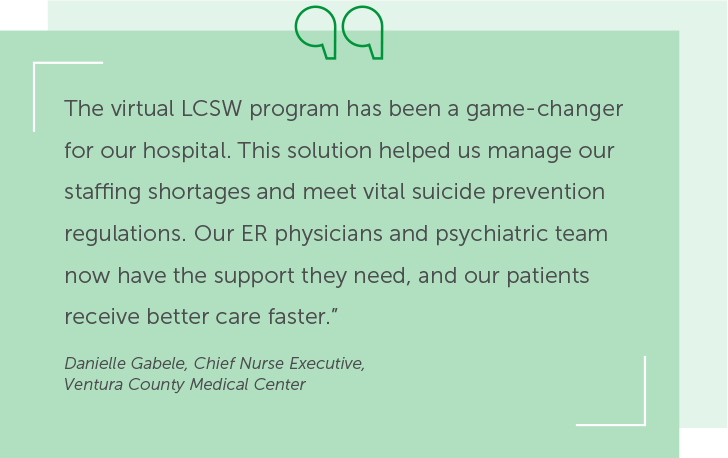Improving Suicide Prevention at Ventura County Medical Center and Santa Paula Hospital
Hospitals today face a variety of challenges, from workforce shortages to regulatory compliance. With limited resources and a critical need for Licensed Clinical Social Workers (LCSWs) to meet suicide prevention regulations, one safety-net hospital system in California implemented an innovative virtual LCSW program to ease the pressure on their full-time teams and improve patient care.
Challenge
Ventura County Medical Center and Santa Paula Hospital in Southern California faced significant challenges in maintaining adequate staffing levels, particularly among providers needed to screen psychiatric patients who entered the system through the emergency department. This issue was exacerbated by the introduction of new regulations in 2019, which mandated suicide risk screening for all patients. The regulation required hospital staff to screen for suicide risk, adding to the already heavy workload of the overworked psychiatric team evaluating every patient.
The hospital’s only psychiatrist was overwhelmed with their primary duties and taking on the additional screenings resulted in bottlenecks. The hospital needed a viable solution to ensure compliance with the new regulations—and to provide necessary care for psychiatric cases—while lessening the burden on its existing staff of one psychiatric provider. The need for a cost-effective, efficient solution was paramount, leading Ventura County Medical Center and Santa Paula Hospital to explore virtual LCSW services.

Solution
The facilities partnered with LocumTenens.com to address their staffing challenges by hiring LCSWs to consult with patients remotely. A dedicated recruiter was assigned to identify candidates who would best match the needs of their facility. The initial implementation focused on the Emergency Department, providing expanded schedule coverage. This virtual team began with a small number of LCSWs who, after showcasing the work they were providing, expanded to cover more than 30 units throughout the hospital.
The process evolved from there:
- The hospital utilized the Columbia Suicide Severity Rating Scale (C-SSRS) as the screening tool, a market leader in suicide risk assessment.
- ER nurses conducted the initial screenings, and patients flagged for suicide risk were referred to virtual LCSWs for further evaluation.
Technology played a crucial role in this solution. The hospital employed both HIPAA-compliant technology and remote staff to facilitate virtual consultations, ensuring that patients received timely assessments. This approach, which was simple and cost effective, not only streamlined the process but also ensured that patients with behavioral health concerns received the necessary care.
Results

The virtual LCSW program serving Ventura County and Santa Paula yielded significant benefits for the facility, staff, and patients. Key outcomes included:
- Improved Patient Care: The timely suicide risk assessments provided by virtual LCSWs enhanced the quality of care for patients with behavioral health issues, assessing 112 patients per month on average. The hospital could now offer expanded suicide-safe monitoring and necessary interventions beyond the typical 8 AM - 5 PM window when psychiatrists typically work.
- Increased Efficiency: By shifting the duties of suicide risk assessments to virtual LCSWs, ER physicians and inpatient psychiatrists could focus on their primary responsibilities.
- Extended Staffing Effectiveness: The virtual program maintains a team of LCSWs, providing consistent support across 35+ units and two hospital facilities under the same license.
- Cost-Effectiveness: The implementation of LCSWs enabled the hospital to meet regulatory requirements and improve patient care without the significant expenses associated with hiring full-time permanent staff to serve at each location.

Conclusion & Looking Ahead
This success story underscores the need to expand our strategic approach when addressing evolving challenges in healthcare. In the case of Ventura County and Santa Paula, embracing innovation resulted in improved processes for the healthcare providers involved, and better service and outcomes for patients affected—all while complying with suicide prevention regulations. There is enormous potential to replicate these enhancements across other facilities and specialties.
Looking ahead, the success of this program shines a light on several key considerations for other hospitals as they implement similar solutions:
- Ensuring that the necessary technology is in place and easy to use is critical for the success of virtual programs.
- Proper training and continuous education for staff are essential to integrate new workflows effectively.
- Establishing clear, streamlined processes can help ensure smooth operation and high-quality patient care.
Presently, opportunities for virtual behavioral health solutions are numerous and growing. According to LocumTenens.com’s clinician survey data in 2023, 68% of Behavioral Health Specialists actually prefer to work remotely all or part of the time.
By focusing on the strategic deployment of locum tenens staffing and the innovative use of virtual services for critical patient care, Ventura County Medical Center and Santa Paula Hospital have set a benchmark for effective healthcare staffing solutions.
Contact LocumTenens.com to discuss tailored staffing solutions that meet your specific needs and drive excellence in patient care.
